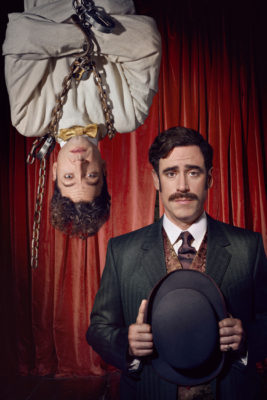
HOUDINI & DOYLE: L-R: Michael Weston as Harry Houdini and Stephen Mangan as Arthur Conan Doyle. © 2016 FOX Broadcasting Co. Cr: Joseph Scanlon / FOX.
FOX’s new series, Houdini & Doyle (Mondays 9/8C), has a delightful premise: real-life friends Harry Houdini, Master illusionist, escapologist and debunker of supernatural charlatans, and Arthur Conan Doyle, creator of Sherlock Holmes and devout believer in the paranormal, team up to solve crimes.
Unfortunately, Houdini & Doyle is Sherlock minus intelligence, style, wit and substance. It’s also set years before the two met and became friends.
In Manus Dei, the series premiere finds our two historical heroes investigating the death of a man who scoffed at the healing powers of God – as purveyed by traveling preacher Elias Downey (Nathan Stewart-Jarret, Misfits) in tent meetings organized by his sister Jane (Enuka Okuma).
The teaser shows us the scene at the faith healer’s tent and we movie to a scene with Doyle (Stephen Mangan (the original Dirk Gently, Episodes) and his wife Touie (Louise Delemare, Torchwood, Dracula) preparing to go out to dinner – a scene that shifts into one of Doyle beginning to box up his wife’s dresses.
From there we find ourselves in Scotland Yard, where Houdini (Michael Weston, House, Elementary) is holding forth on the idiocies of faith healers – with Doyle taking the view that not all faith healers are charlatans. A pretty young woman in the room takes up Houdini’s argument. She is Constable Adelaide Stratton (Rebecca Liddiard, MsLabelled) – our first major anachronism (I’ll leave you to discern the others if you should decide to give Houdini & Doyle a shot).
Houdini, Doyle and Stratton go behind her boss’ (Tim McInnerny, Spooks, New Tricks) back to perform an autopsy on the unfortunate Mr. Batch – and prove he was murdered.
Given that the premise of the show is that Houdini is the grounded skeptic, one would expect him to exhibit some traits of a detective, but he’s more concerned (it seems) with illusions – while Doyle, who gets grief on a regular business for the methods of his detective hero Sherlock Holmes, never actually uses any of those methods himself.
Instead, he seems particularly gullible about mediums and ghosts and such – though, in next week’s episode, when one medium screws up, showing herself to be a fraud, he’s more disappointed than anything else.
The only real investigator of the three seems to be the one character who wouldn’t have existed at the time, Constable Stratton. She winds up with the scutwork – searching files, looking for motives and so forth. Liddiard makes her the one genuinely likable character in the series – but also showers her with the era’s casual misogyny (when her boss is told she did good work, he tells her point blank that he thinks she must be having an affair with her supporter).
Houdini’s performance of some illusions is mildly entertaining, but the rest of the time, he’s a vainglorious peacock whom we could never see as friend material – and Doyle is no better: his complete faith in the paranormal makes him as big a jackass as Houdini, just over a different subject.
Even the dialogue is awful.
In the second episode, for example, Houdini rushes up to Doyle and cries, I’ve had an epiphany!’ Doyle responds, ‘Do you know who the murderer is?” ‘No.’ ‘Then my epiphany trumps yours.’ (And that’s one of the more sparkling bits of repartee.)
So, Houdini & Doyle is not just historically inaccurate, it’s bereft of style and wit and kind of stumbles along almost like it knows where it’s going.
Fortunately, there are only ten episodes of the show, so it won’t be long until something better comes along.
Final Grade: D